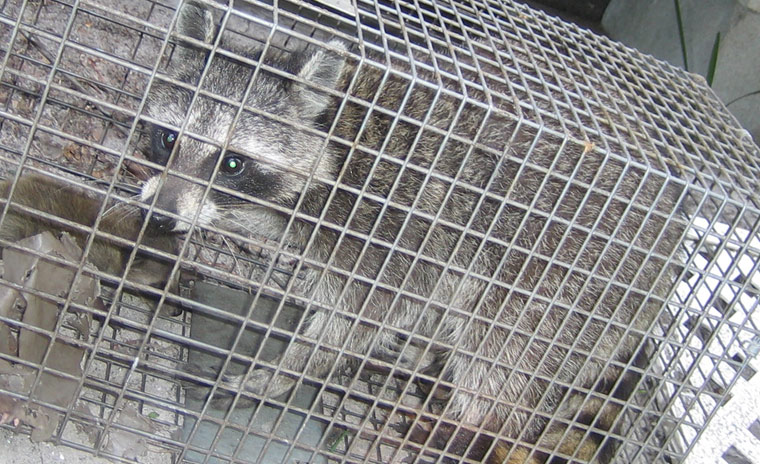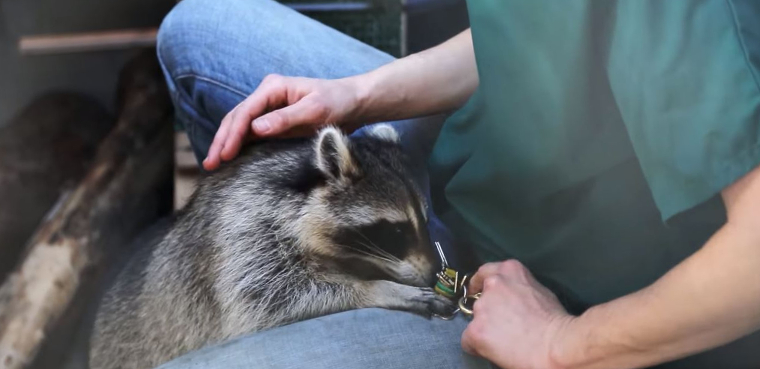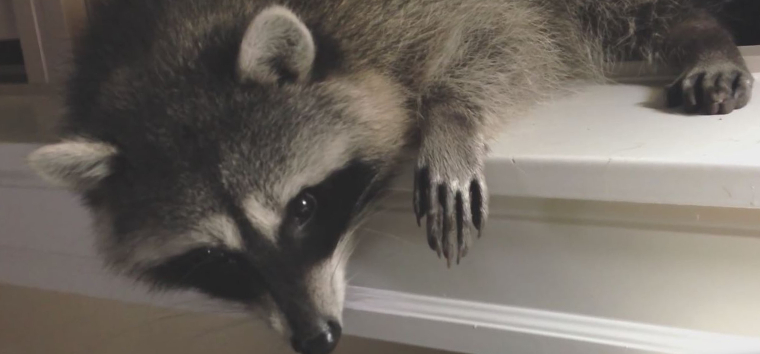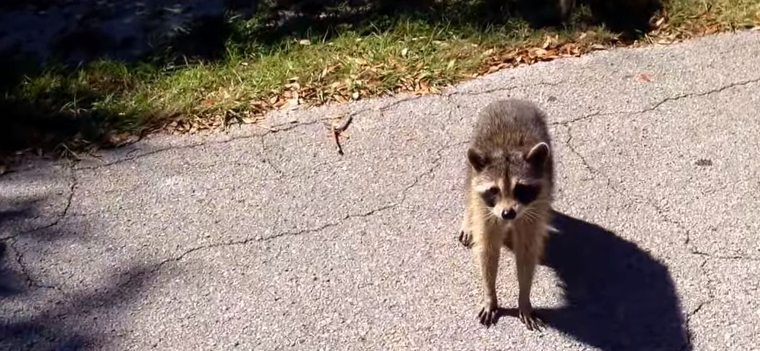-
info@aaanimalcontrol.com
Call us for help in your town
Humane Wildlife Education
Steps To Take When You Are Bitten by A Raccoon
Need raccoon removal in your hometown? We service over 500 USA locations! Click here to hire us in your town and check prices - updated for year 2020.
If you are bitten by ANY wild animal, we would recommend that you get yourself off to see a medical professional as soon as possible. The bite itself might not look so bad, and in some cases you might not even see much of an injury at all. Sadly, this does not mean you are safe. As well as the physical injuries you may experience when you come face to face with an angry, attacking raccoon, there are also more than a few disease threats to concern yourself with.

Raccoons are perceived as quite cute creatures, especially on social media, and although most of them would prefer NOT to attack you, there are times when attack is the only option they see they have. If you have them cornered in a trap, for example, and you’re daft enough to let your fingers get too close, there is a good chance the raccoon will attack, using its claws and teeth to cause damage. It will generally only be when you disturb the raccoon and corner it that you will find it could attack you, but it could get a tad annoyed if you disturb it trying to eat, particularly if it has been hungry for a while.
If you have been bitten or scratched by a raccoon, we recommend seeking urgent medical attention because of the threats of disease: rabies, salmonella, leptospirosis, and raccoon roundworm. As you can imagine, none of them are particularly friendly.
We’ll start with rabies. It’s super dangerous because you MUST get treatment (a vaccination) BEFORE the symptoms start. If the symptoms have already started, death is usually imminent. You won’t be able to know just from looking at a raccoon, or other wild animal, whether or not it is carrying the rabies virus. You won’t even know that the virus has been transferred until a few days or weeks later when flu-like symptoms start to show. You’ll more than likely ignore these, putting it down to just a common cold or flu, and before you know it, you’ll be very poorly indeed. And it would all have started from a seemingly insignificant raccoon bite that didn’t even bleed.
For the record, if a raccoon licks its claws and then scratches you, the rabies infection can still be passed on.
Although raccoon roundworm, salmonella and leptospirosis are generally transferred via the waste matter of the raccoon - feces and urine - they can be spread in all manner of ways, and often without your knowledge.
Wild animals are just that - wild. They are often dirty, rife with disease, and don’t particularly care about the mess they make while they’re tearing into your garbage can or pulling apart from the flower beds in your back garden. The last thing you will want is for those teeth and claws to be tearing into you. Keep your distance from an wild animal, and definitely ones that you know how those sharp teeth and claws. Respect them and they’ll respect you. Get a professional in to remove a wild raccoon and you won’t run the risk of getting bitten or scratched!
What Diseases Can You Get From Physical Contact With a Raccoon?
Need raccoon removal in your hometown? We service over 500 USA locations! Click here to hire us in your town and check prices- updated for year 2020.
There are many diseases associated with raccoons, mostly with the urine and feces that they leave behind. There are also many diseases that you can get from actual physical contact with a raccoon, however, and it is these problems (aside from rabies) that people frequently forget about.

Out of all rabies cases in the USA in 2015, raccoons were responsible for close to thirty percent of them, making them one of the most dangerous creatures across most of the south-east states. It is not actually that common for people to get rabies from raccoons, although, the numbers are on the rise with more wildlife-human interactions occurring.
Infections are a big deal when you are bitten or scratched by any wild animal. Being given the all-clear for rabies is obviously going to be something to breath a sigh of relief over, but raccoons and other wild animals, particularly scavengers, are not really known for the greatest levels of personal hygiene. They pee and poop all around the place, getting the stuff on their front and back paws and other places on their bodies. They do wash themselves, of course, but their levels of personal hygiene certainly do not live up to the standards that you and I are accustomed to living to.
If you are bitten or scratched by a raccoon, or by another animal, you run the risk of that wound becoming infected. You might think that it is “just a scratch” but unless you have had that coming straight form a professional, you can't be sure that the scratch is just that. It could end up being more than that — you might need stitches, you might need a tetanus shot, and you might need treatment for rabies.
Although infections and rabies are the only serious diseases that you need to worry about as far as actual physical contact with raccoons are concerned, their feces and urine also contain a plethora of other dangers which can actually also be passed on through physical contact also — accidental cross-contamination. These include:
Salmonella and other bacterial infections that cause stomach upsets
- Leptospirosis
- Giardiasis
- Baylisascaris procyonis, also known as raccoon roundworm
Raccoons Myths: All Raccoons Have Rabies
Need raccoon removal in your hometown? We service over 500 USA locations! Click here to hire us in your town and check prices- updated for year 2020.
Although many believe it to be true, it is actually quite rare for you to come across a raccoon that has rabies in the wild. However, that doesn't mean that you can get complacent when coming too close to these masked garden invaders — just because it is rare for a raccoon to be infected with raccoons doesn't mean it can't happen. It can happen, and it does happen. In fact, it has happened.

Raccoons and many other animals across the United States are known to carry the rabies virus, and any animal that has the potential to bite or scratch you, has the potential to infect you with the virus too. It's not just you — your pets, your family, your children are all at risk.
Pets — cats and dogs — can be vaccinated against rabies and, in some countries, it is a necessity. By law, you must have your pet vaccinated against the virus. You certainly can't travel anywhere in Europe without a 'pet passport' which very clearly displays the rabies-free status of your pet. If you do not get your pet vaccinated and it happens to come across a rogue raccoon in the back yard, the worst could happen — your pet could be infected with rabies.
In one year — 2015 — over 92 percent of all rabies cases were as a result of wild animal conflicts. The most prolific offender is the bat, with over thirty percent of all cases in that year, but the next culprit was the raccoon — responsible for 29.4% of all rabies cases in the USA for 2015.
In that same year, the highest hit areas in the United States for raccoon-related rabies cases were from Maine right down into Florida and across the South East coast to Alabama and Louisiana, and also in some areas of Tennessee, Kentucky, West Virginia, and Ohio.
Not all raccoons have rabies, but raccoons are one of the most responsible animals across the United States for spreading the disease.
Do raccoons attack people?
Need raccoon removal in your hometown? We service over 500 USA locations! Click here to hire us in your town and check prices- updated for year 2020.
All wild animals have the potential to be dangerous and attack people, and the name really does give the game away — “wild” animals. They are wild, not domesticated, like your pampered pooch or feline friend. They do not know how to act in a “tame” manner — being petted by people, fed by people, relying on them for food, water, and shelter. They will find food and water in every way that they can and, unfortunately, they have started to associate people with food, water, and shelter. We're feeding them. Sometimes deliberately, but most of the time by accident. Raccoons (especially) have sharp teeth and claws, able to get through garbage bags with no problems at all, and also to uproot or dig up tasty worms and grubs in your garden.

In some cases, people have been hand-feeding raccoons and in this cases, the raccoons get used to the interactivity. They start to associate humans -- the human hand — with readily available food, and will therefore go up to any person to try and get food out of them. It is possible, in these cases, for a raccoon to attack people because they aren't getting what they want, much like a toddler would have a temper tantrum.
Raccoons, much like other wild animals, do not attack for no reason. They're quite lazy animals by nature, and although they can attack for food, and will on occasion, they will generally choose prey that is considerably smaller than they are — rats, mice, rabbits, smaller mammals, roadkill, and even the leftovers that you throw out in the trash. You'd be surprised at how much food raccoons can get from the pet foods that you leave out on the porch. No wonder your dog is so angry all the time. He's probably hungry. A raccoon has been stealing all of his food. (It happens.)
Against a person, most raccoons would much rather run away. They know they won't win against an animal as big as a person, so they probably won't even give it a shot. There are a few exceptions to this rule, of course, and these are as follows:
1 - The raccoon feels threatened.
If you have the animal cornered or in a trap, it will feel threatened and is, therefore, more likely to attack.
2 - You are getting too close to a female raccoons' young in the nest.
They will defend their young to the death in many cases, and although you will probably still come out of the fight better than the raccoon will, there's a good chance that you will still experience nasty wounds.
3 - You are interfering with a male raccoon trying to find a mate.
Male raccoons are notoriously bad-tempered when it comes to breeding season. If you interfere with them finding a female and proving that they are the best male for the job, you'd better watch out. In fact, raccoons aren't the only animal to do this. Peacocks will attack anything that gets in the ay of mating season, and they have even been shown to fight their own reflection in the windows and shiny surfaces of cars. Raccoons aren't quite that silly, but they are still very grumpy when they feel the need to mate.
4 - You have been feeding the raccoon and all of a sudden stop.
Much like a toddler would have that temper tantrum we described earlier on, a raccoon will become aggressive and bad-tempered if you suddenly stop providing something that they have come to know you for. If you stop giving them a saucer of milk or food, for example, there's a good chance they will literally break in to help themselves.
For more information, you may want to click on one of these guides that I wrote:
How much does raccoon removal cost? - get the lowdown on prices.
How to get rid of raccoons - my main raccoon removal info guide.
Example raccoon trapping photographs - get do-it-yourself ideas.
Raccoon job blog - learn from great examples of raccoon jobs I've done.
raccoons in the attic
Are Daytime-Active Raccoons Infected With Rabies?
Handling Raccoons: How Safe Is It?


















